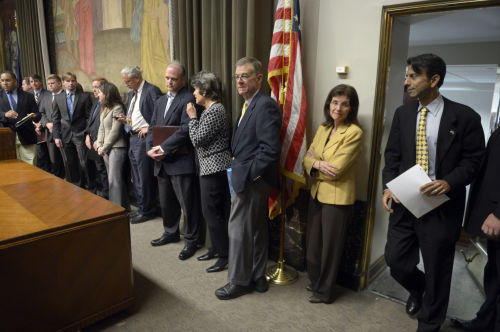Rec board members resign. Now what?
May 14, 2013What’s the real deal?
May 14, 2013After days of closed-door negotiations, the Louisiana House backed a nearly $25 billion budget Friday that deeply diverges from spending plans recommended by Gov. Bobby Jindal.
The bipartisan plan was a rare showing of independence for lawmakers who traditionally follow the governor’s lead on the budget, but who have become increasingly frustrated with Jindal’s approach.
Lawmakers objected to Jindal’s proposal to pay for continuing programs with $500 million in financing from property sales, legal settlements, fund sweeps and other items that haven’t yet happened and that would only drum up money for one year.
The House compromise would replace those dollars with more than $60 million raised from trimming tax break programs, $133 million in cuts to state agencies and $200 million expected from a tax amnesty program.
“We replaced the one-time money and contingencies with real dollars,” said Rep. Brett Geymann, R-Lake Charles, a leader in the budget negotiations.
Many of the piecemeal dollars proposed by Jindal would instead be used for debt payments, construction work and highway projects, considered one-time expenses.
Proposed cuts to domestic violence programs, breast and cervical cancer screenings and a program that helps elderly citizens apply for discounts on medications were reversed. More money for at-home services for disabled people was added. Dollars were provided to train new state troopers.
A 93-5 vote sent the budget for the 2013-14 fiscal year that begins July 1, after seven hours of House debate on the full package of bills used to balance the spending plan. Now, haggling shifts to the Senate, where House members will seek to persuade their colleagues to keep the compromise package intact.
To make the numbers balance, however, the budget plan would use some short-term fixes, like the dollars from the amnesty program, and assumes $90 million in improved revenue estimates that haven’t yet been projected.
It also continues to assume savings proposed by Jindal from the privatization of most of the LSU-run public hospital and clinic network, though many of the deals aren’t even complete.
Questions have been raised about whether the numbers work. The Legislature Fiscal Office analysis, for example, doesn’t confirm estimates of how much could be raised by the amnesty program, saying the collection rates were unclear.
Jindal opposes pieces of the package that he considers a tax hike and says he will veto changes to tax break programs that would raise new dollars for spending.
Leaders of the Republican delegation, the Democratic caucus and the black caucus worked together to devise the final deal.
“It was a great week for the House of Representatives. It was a great week for the people of Louisiana,” said House Speaker Chuck Kleckley, R-Lake Charles.
Appropriations Committee Chairman Jim Fannin, D-Jonesboro, who handles the budget bill, didn’t necessarily agree with the final approach crafted, but he didn’t object to its passage.
“I understand what a process is, and I understand how important it is, even though to the outside community it looks like a mess. At the end of the day, democracy truly works,” Fannin said.
As part of the package, lawmakers overwhelmingly supported proposals to trim tax breaks for big box retailers, film and TV productions and the oil and gas industry.
“I don’t take great pleasure in doing something against business. I’m in the business world. But the reality is, I don’t know how much more we can cut higher (education). I don’t know how much more we can cut health care, hospitals,” said Rep. John Schroder, R-Covington.
As part of the compromise, the House also agreed to bills tweaking the budget process, to limit the use of patchwork funding for ongoing programs.
And they backed a tax amnesty program, which would stretch over 30 months and allow delinquent taxpayers to pay overdue taxes with eliminated or lessened penalties as a way to generate upfront cash for the budget.
Those measures all are tied together – and tied to the budget bill.
Supporters of the plan said they were closing corporate tax loopholes to help stop deep cuts to health services and public colleges.
Debate hit a snag over whether to suspend tax rebate programs that haven’t yet taken effect, with Republicans at odds over the idea before it was approved 76-23 for the compromise package.
The rebate programs, created last year at the request of the Jindal administration, will give payroll tax cuts to companies that create high-paying jobs with health care benefits and a hefty rebate on relocation costs for companies that move their corporate headquarters to Louisiana.
Critics of the suspension said it would jeopardize ongoing negotiations the state’s economic development department has with several companies.
“This amendment will kill jobs in Louisiana,” said Rep. Gordon Dove, R-Houma.
Supporters of the suspension said Louisiana needs to set priorities and stop handing out more dollars in tax breaks while cutting public services.
“We can be giving away all of the money in the state treasury, but we won’t have any money to provide infrastructure, education and workforce development if we keep this up,” said Rep. Greg Miller, R-Norco.
The start of the rebate programs – along with a new tax break program that will give rebates for donations to voucher programs that allow children to attend private schools – would be delayed until 2016.
Louisiana Gov. Bobby Jindal, far right, enters the Governor’s press conference room outside his office on Tuesday, May 7, 2013, at the Louisiana State Capitol in Baton Rouge.









